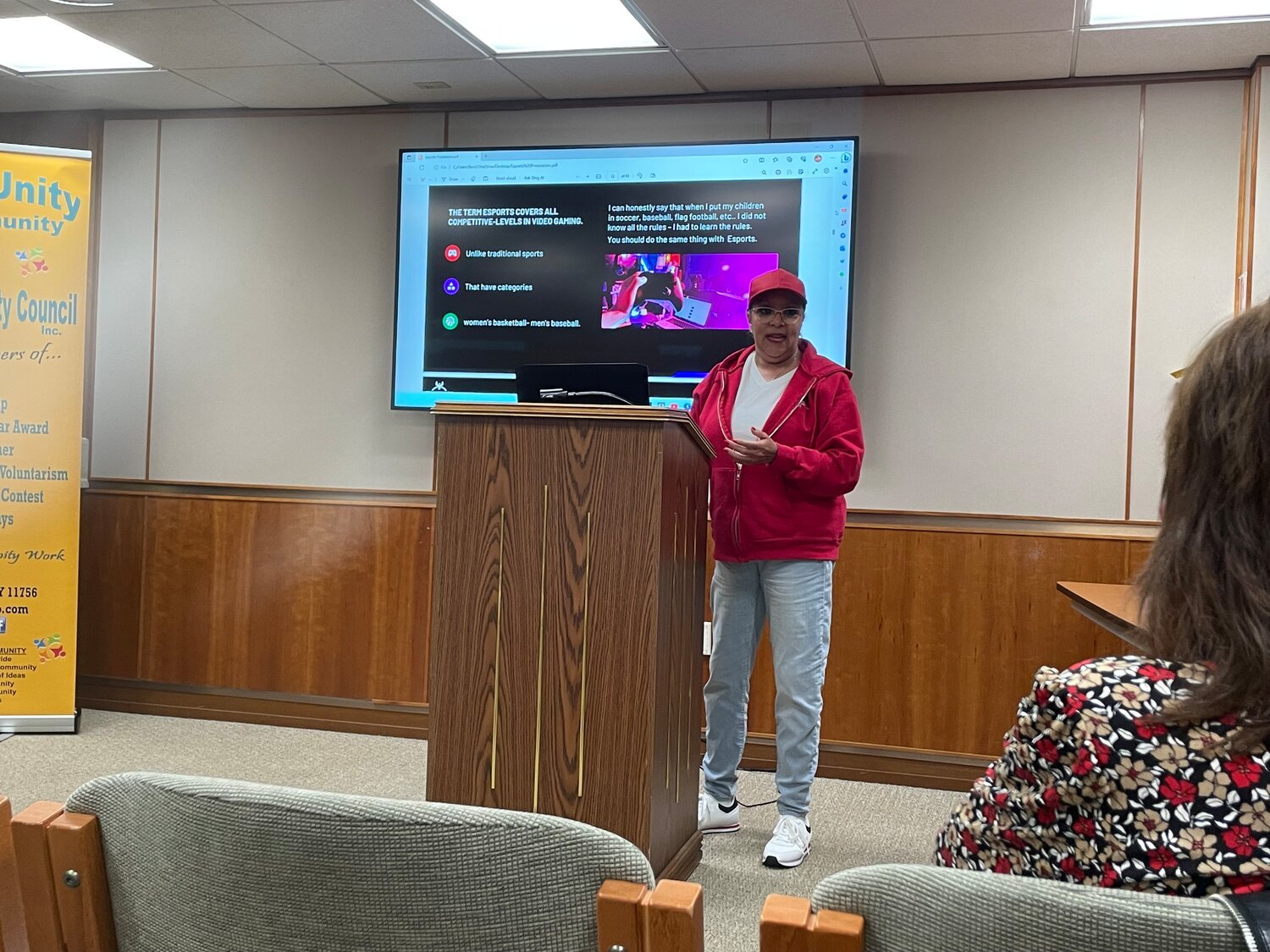Bridging the esports gap with older generations
Karen Quinones-Smith said she hated the attraction video games held over her two sons.
But she continued buying them games and accessories because playing them was something they liked doing with their friends.
After a while, the Levittown mom started to understand the strategies, the skills involved, and the joys of winning. She realized that she had been transformed into an “esports mom” and started a company, Bridging the Gap in Esports, to educate other parents on the industry. She even wrote a book on the topic, called “Confessions of an Esports Mom,” which will be available in two weeks.
Quinones-Smith gave a primer on esports at the Levittown Public Library on Oct. 18, sponsored by the Levittown Community Council.
Her eldest son, Brandon Smith, 21, is now in medical school, but her other son, Christopher, 20, is a professional gamer. Quinones-Smith wants parents to know that gaming doesn’t stop kids from doing what they want to do, but she teaches parents how to promote moderation and balance.
Quinones-Smith said parents should talk to their children about who they’re playing online, just like they would talk to them about their friends in school. Learning the basic rules of the game is a way for parents to keep the lines of communication open with their kids.
Although some may picture a gamer as a solitary person sitting for hours in front of a computer, they are not isolated, Quinones-Smith said. Her son can talk and laugh with the people he’s playing with, even if they’re not in the same room, and he now goes on trips with them to tournaments around the country.
Skills learned in gaming are transferable to other areas of life, including hand-eye coordination and teamwork. As a medical intern, Quinones-Smith’s eldest son was able to easily use a robotic arm, required during some surgeries, because controlling it is similar to using a gaming control.
During gaming, the video screen is called a map, and players have to keep track of where their team members and opponents are, and any obstacles. This is a skill valued by air traffic controllers, who, according to Quinones-Smith, are looking to recruit members from the gaming community.
First popularized in the 1970s, the gaming industry has been exploding everywhere, gaining momentum during the pandemic because gaming could continue throughout a time when people were staying home. Stanford University held the first video game competition in 1972, with the winner receiving a subscription to Rolling Stone magazine. Eight years later, Atari held a tournament with 10,000 competitors.
Quinones-Smith went to her first professional gaming tournament in 2018 at Barclay’s Center. Having no idea what to expect, she brought a book, but she said watching the games was so electrifying and fun that she did not end up reading it. Teams have sponsors, just like in regular sports, and players get a salary. They can also get paid for endorsements.
The tournament at Barclay’s Center was live, but games were simultaneously streamed on Twitch, an interactive livestreaming service for content spanning gaming, entertainment, sports, music, and more. Another social platform used by gamers is called Discord, where users have the ability to communicate in private chats or as part of communities called "servers." Being on Discord is a must for gamers looking for coaches, or coaches looking for gamers with specific skills to add to their teams.
Many high schools feature esports clubs and teams, and Quinones-Smith is trying to spread the word on Long Island, where esports are not as popular as they are in the rest of the country. If a student excels at esports and has a coach, the coach can give the student a recommendation when applying to colleges.
Many colleges feature esports programs, which can range from simply a club to a varsity team, to classes in aspects of esports, such as esports management, broadcasting, videography, content creation, marketing and event planning. Quinones-Smith, as part of her business, can provide students with a list of questions when applying to college to determine if the level of esports activity at the school matches the level of the student’s interest. Many SUNY schools have esports programs, and Yale, Harvard and Brown are just a few of the schools that offer them as well.
Parents and students should know that scholarships for esports are also available at many schools, with some covering the full tuition, Quinones-Smith said. For those participating in tournaments, 90 percent of colleges allow students to keep any tournament winnings, while others put the winnings back into the esports programs.
Quinones-Smith, who started her business with a mission, based on her own experience with her sons, encouraged parents to “transform their (kids’) love of gaming into career pathways.”






